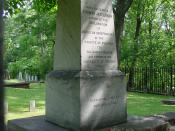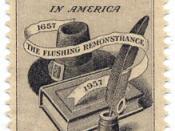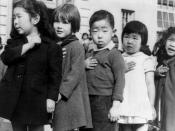Religious Freedom in America
The American perspective of religious freedom has changed significantly over the past few centuries, especially after the implementation of Thomas Jefferson's Statute of Religious Freedom. The affiliation of church and state and the policies towards religion in schools have also changed dramatically and continue to be a constantly changing issue today. Religious freedom was a new concept in 1786, especially since colonies like Massachusetts and Pennsylvania were founded on religious implications. The transformation of the general view of religion is evident in the distinct separation between church and state today.
The views of the Founding Fathers played a tremendous role in the step towards religious freedom in America. Several of the Founding Fathers, including George Washington and Thomas Jefferson, were deists; this provided alternative perspectives on the religious situation of the time. Their general belief was that discrimination against certain religious beliefs, or lack thereof, was unjust and corruptive of the true meaning of religion.
Jefferson's Virginia Statute of Religious Freedom expanded on this. Attempting to impose religious belief on someone and expecting him or her to contribute was viewed as "sinful and tyrannical," and forcing them to support and spread the "religious persuasion" was severely restrictive on a desired "comfortable liberty" that every individual deserves. The decree also stated that "our civil rights have no dependence on our religious opinions," meaning that individuals should be granted full rights regardless of religious preference. Unless expressing intolerance for others' religious beliefs, an individual has a natural right to the privileges and advantages in common with his fellow citizens. The notion of "natural right" struck me as a kind of ultimatum of some sort; any consideration of religious belief was completely wiped out. There was absolutely no religious context in your rights unless you blatantly expressed intolerance.
The Statue of Religious Freedom generally applied to government and state. With the Northwest Ordinance in 1787, it was agreed that rights had no dependence on religious belief; it also brought up, however, the issue of religion in the context of education. The Ordinance stated that "religion, morality, knowledge, being necessary to good government and the happiness of mankind, schools and the means of education shall forever be encouraged." Schools were still viewed as tools for spreading ideas on morality, which in turn was still generally associated with religion. Propagation in schools maintained a significant distance from the status of propagation in state.
All of the relatively new viewpoints of the eighteenth century directly influenced our current views on religion in state and in schools, emphasizing more focus on the latter. Currently, religion in schools is a huge controversy. Issues concerning morality and knowledge continue to play a big part. It's my impression that different parts of the United States have different viewpoints on religion in schools (some support endorsement of religious activity in schools while others are adamantly opposed to any kind of support of religious activity), but I think that among all the controversy regarding students' rights and freedom of this and that and whatever else it is that people want to argue about these days, certain terms have been settled.
The overall status of religion in schools is pretty much an issue of forced implementation; students cannot be forced to engage or participate in any religious activity. Similarly, students cannot be forbidden to engage in their own religious practices if they are not disrupting the education of others. Public schools cannot endorse or support any religious activity.
To me, this approach seems effective; there are, however, some problematic results. A few of these problems became evident after September 11th. First of all, huge issues regarding religious rights and freedom resurfaced and new conflicts between Muslims and the American public developed. It is obvious that Americans take pride in their ability to be tolerant of different races, sexes, and religious beliefs. However, it was Americans' intolerance of another putative intolerance that seemed to contradict our established views. It bothered me to hear on the news stories about Muslim public school students being bullied, called terrorists, and condemned by other students. Parents complained to school boards about letting their children attend the same school as Muslims. Everyone understands that standing up for one's freedom is allowed, but when it involves further intolerance, I just see it as hypocritical, stupid, and wrong.
I know that I haven't really experienced or witnessed this kind of extreme intolerance first hand, mainly because most of the students that I know have expressed lots of tolerance towards other students' beliefs; it just seems, however, that a widespread tolerance cannot be guaranteed from everyone.
Another issue concerning religion in schools that surfaced after September 11th was the recitation of the Pledge of Allegiance. When the law requiring the Pledge of Allegiance to be recited in all Illinois public schools was implemented, there was obviously a lot of controversy. A lot of people viewed this new law as a forced implementation of religious belief (with the mention of "God" in the Pledge). To me, this no longer seemed to be an issue of freedom of religion. It seemed to be more about freedom from religion. I admit that having to recite the Pledge bothered me in the beginning (actually, my French class stopped doing it after, like, the first week of school. Honestly, I don't think anyone cares to make an effort to remember to do it anymore). The whole fact that I wasn't being forced, and that I was just being provided the opportunity, helped me get over my initial outrage.
Today, it seems difficult to discern expression of religious belief from proselytizing, and where to draw the lines is a little vague. I do believe, however, that America has come a long way in terms of defining the general objective of the nation's policies of tolerance. There is a very distinct separation between church and state, and I feel that it is incredible how it has kept up. I understand that conflict will continue to be a part in the development of what we, as Americans, have rights to, and it will probably stay that way forever. Hopefully, we can learn from each conflicting experience we have and apply our established viewpoints for the future wellbeing of the nation.


